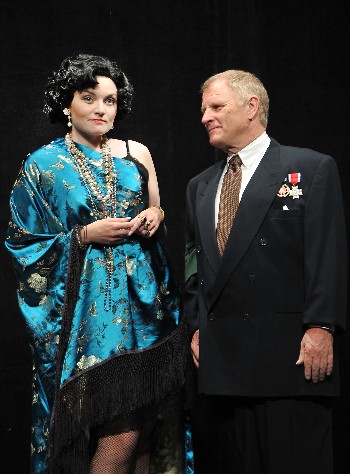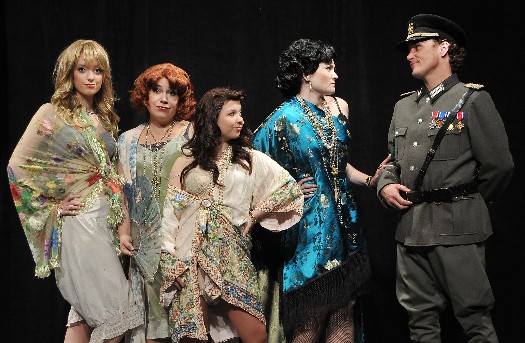Theater Review: A Bright and Literate Version of the Darkly Comic “Measure for Measure”
Director Gus Kikkonen and cast come up with a bright, literate presentation of William Shakespeare’s play Measure for Measure, a potentially dark comedy pregnant with power.
Measure for Measure by William Shakespeare. Directed by Gus Kaikkonen. Staged by the Peterborough Players at the Peterborough Players Theatre, Peterborough, New Hampshire, through September 11.
By Jim Kates

Gordon Clapp (Duke of Venice) and Bridget Beirne (Mistress Overdone) share confidences in the Peterborough Players production of MEASURE FOR MEASURE. Photo: Deb Porter-Hayes.
Measure for Measure contains more unpleasant characters per square inch than any other Shakespeare play. The only two personages you would care to entertain at your dinner table are notable mostly for their wimpiness—one spends the entire play in justifiable fear of execution, the other mopes in genteel rejection by her once betrothed. The plots turn around the general unpleasantness these two are victims of. One challenge of a production is to make us care about all these people. Too often, the play is regarded as more caught up in its ideas, or in its trials of power and strength, than in its characters or its stories.
And yet I find Measure for Measure dynamic; it moves on dynamic alone, not on any presumed theology. The Duke of Vienna, wanting to reset the course of his state, has jumped ship and left its guidance to his deputy, who discovers in the course of five acts his own hypocrisy. But the Duke has not gone far. Disguised as a friar, he returns to Vienna in full manipulative mode. Caught up in these machinations are Claudio, a young man who has impregnated the woman he plans to marry and is thereby condemned to death, the young man’s sister Isabella, pledged to a nunnery, and a passel of lowlifes.
Director Gus Kaikkonen has created a brilliantly staged production at the Peterborough Players, freeing up the sticking points in this “problem” play by relying confidently on its comedy. A perhaps implied but unscripted recognition scene adds a grand, funny touch as well as credibility to the last act. The Players take on the underlying darkness by setting Measure for Measure in 1930—a different Vienna from that of dukes and monks but not unbridgeably different. Bridget Beirne turns the whoremonger Mistress Overdone (nine husbands, “Overdone by the last”) into a sultry cabaret singer punctuating the scenes with singularly appropriate songs by Kurt Weill and Frederich Hollander. (Ellen Mandel arranged the music.) Proto-Nazi-looking uniforms (designed by Lara de Bruijn) on the guards and officers add just a touch of menace.
Karen Peakes turns Isabella into someone you would, by the end of the play, want to invite to dinner. One of the subtle triumphs of this production is how her character warms and grows from beginning to end; in fact, she starts out quite unconvincing the colder and more restrained she must act. With every touch of passion, her character gains in warmth. Propositioned by the Duke’s deputy—Angelo, played for the most part credibly by Ryan Farley, although I could have wished for a little more defensive bluster in the last act—she comes alive under his nasty hands. This all goes to underline that chastity, which she defends even at the risk of her brother’s life, is not a virtue Isabella can take for granted.

Lizzy Miller, Courtney Cook, Amanda Speare, Bridget Beirne, and Wayne Asbury In MEASURE FOR MEASURE. Photo: Deb Porter-Hayes.
Kraig Swartz also turns Pompey the bawd—that is to say, a pimp—into someone not only funny but damned near lovable. His courtroom defense of the activities of his brothel make perfect sense. Gordon Clapp’s Duke of Vienna—a control freak without the courage of his convictions—has an unfortunate delivery of his lines, chopping them up into, isolated phrases not, completely consistent with their meaning, like National Public Radio’s, Ira Glass. Aside from that, he offers a commanding bureaucratic presence and manages to override the unpleasant irrationality of the Duke’s manipulations.
Ryan David O’Byrne revels in one of the most distasteful of the Viennese lot, the louche gentleman Lucio, and leads us to revel, too, in Lucio’s decline and fall.
Kaikkonen and the players have been generous in Measure for Measure in the use of their apprentice company, so that the callow Claudio (Christopher R. Kelly) and his wife-to-be Juliet (Lizzy Miller) come by their youth easily. Courtney Cook is Angelo’s spurned, betrothed bride, Mariana, and comes into her own in every sense in the final scene. Ed Madson, playing the constable Elbow, has a lot to learn but shows promise.
If there is one problem with this production of Measure for Measure, it’s in the measure of the tempo. Kaikkonen seems to lack confidence in the audience’s apprehension of Shakespearian clarity, and so the words move more slowly than they should, they lag a little behind the action, and the verse is left to shift for itself instead of being comfortable in the actors’ mouths. But this is a quibble, probably indiscernible to those who don’t already have the play fully in our heads. Here is a bright, literate presentation of a potentially dark comedy pregnant with power.

